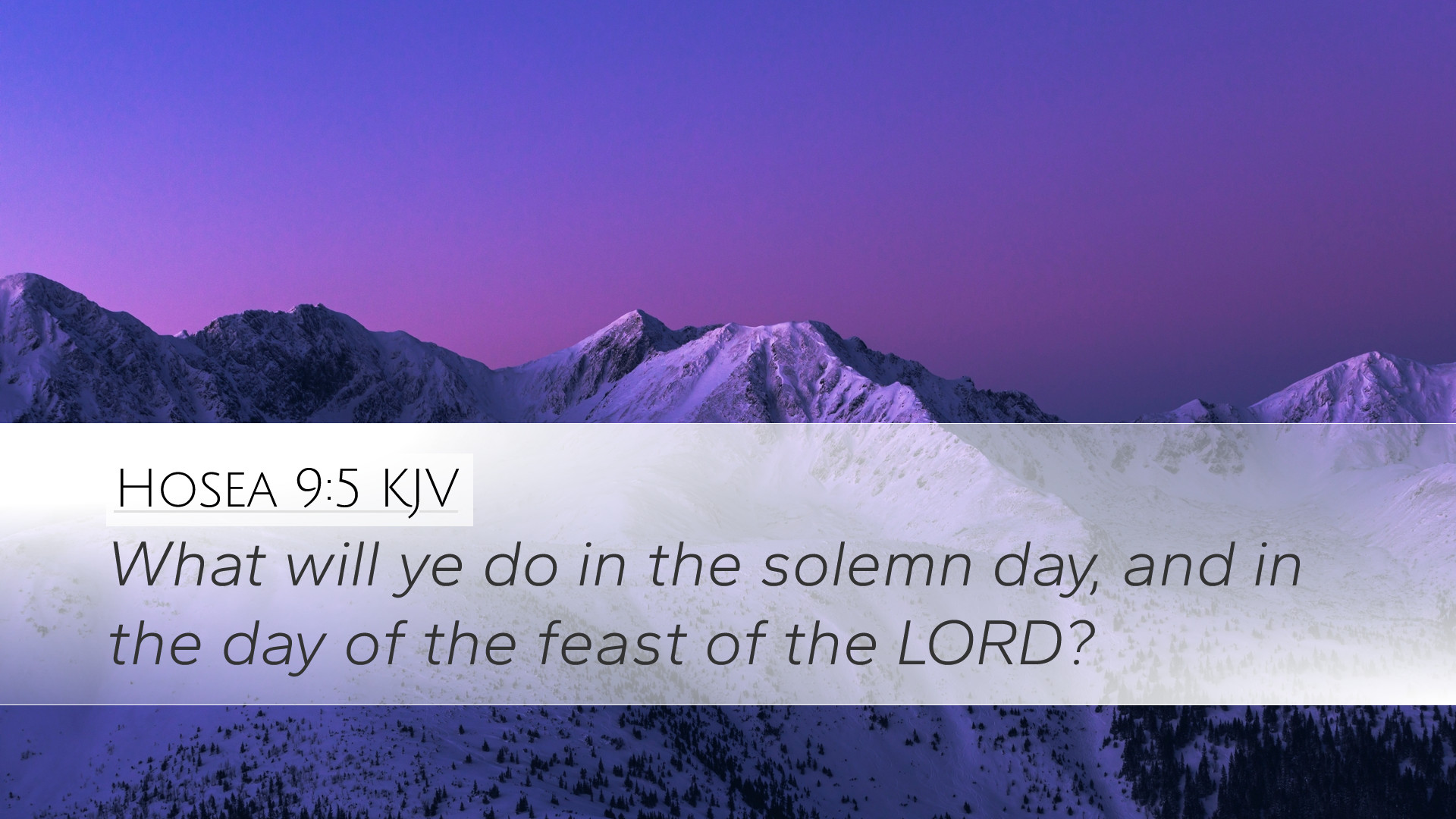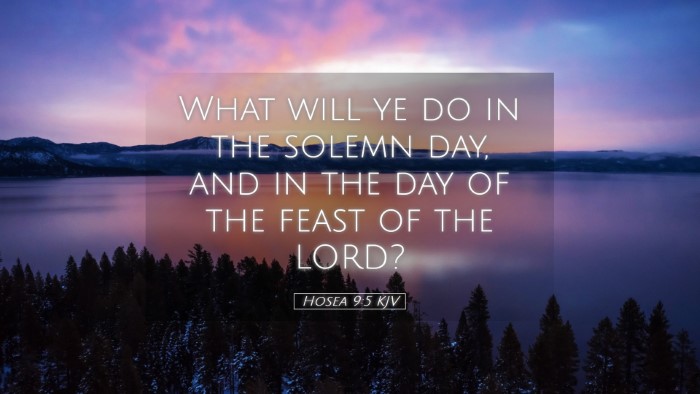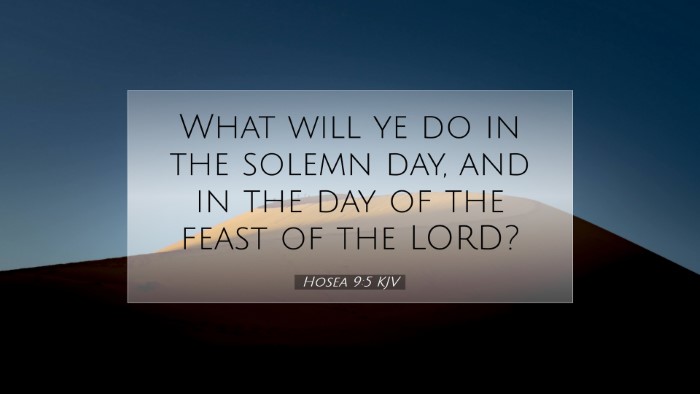Old Testament
Genesis Exodus Leviticus Numbers Deuteronomy Joshua Judges Ruth 1 Samuel 2 Samuel 1 Kings 2 Kings 1 Chronicles 2 Chronicles Ezra Nehemiah Esther Job Psalms Proverbs Ecclesiastes Song of Solomon Isaiah Jeremiah Lamentations Ezekiel Daniel Hosea Joel Amos Obadiah Jonah Micah Nahum Habakkuk Zephaniah Haggai Zechariah MalachiHosea 9:5
Hosea 9:5 KJV
What will ye do in the solemn day, and in the day of the feast of the LORD?
Hosea 9:5 Bible Commentary
Commentary on Hosea 9:5
Verse Text: "What will you do on the day of your appointed festival, on the feast day of the LORD?" (Hosea 9:5, NIV)
Introduction
The prophet Hosea, the son of Beeri, speaks to Israel at a time of great turbulence and moral decay. Their feasts, meant to be times of joyful celebration and worship, have become empty rituals disconnected from true devotion to God. This verse highlights the crucial question of what Israel will do when faced with the reality of their impending judgment, particularly during the sacred appointed times that should have held significance in their covenant relationship with Yahweh.
Contextual Analysis
To fully grasp the weight of Hosea 9:5, it is essential to understand the sociopolitical and spiritual context of Israel during Hosea's prophetic career. The northern kingdom of Israel had given in to idolatry and moral depravity. This particular verse serves as a poignant reminder of the futility of their religious observances when disconnected from sincere repentance and obedience to God's commands.
Insights from Public Domain Commentaries
Matthew Henry's Commentary
Matthew Henry emphasizes the irony in Israel’s situation. The festival days, which should have reflected their loyalty to God, instead become days of confusion and despair. Henry suggests that true worship is not merely about the observance of rituals; rather, it is about the condition of the heart. He stresses that when Israel is unrepentant, their feasts become meaningless:
- Ritual without Reality: Their beautiful hymns and sacrifices have turned into hollow shells, devoid of spiritual significance.
- Impending Judgment: The question poses a sharp contrast between their current state and the holiness of the festivals, suggesting that they will be rendered incapable of enjoying them due to God's impending judgment.
Albert Barnes’ Notes on the Bible
Albert Barnes provides a deep exploration of the societal implications of the Hebrew festivals. He notes that these occasions were meant for national unity and the recognition of God’s providence:
- Unpreparedness: The question “What will you do?” implies that the people are unprepared spiritually and materially for God’s feasts, as they have forsaken the true nature of worship.
- Empty Festivals: Barnes argues that these festivals will become a source of lamentation instead of joy, revealing their spiritual condition and disobedience.
Adam Clarke's Commentary
Adam Clarke offers a didactic approach, emphasizing the significance of the festivals in Israel’s liturgical year:
- God’s Laws Forgotten: Clarke points out that the people forgot the laws governing these festivals, which leads to their inability to engage authentically in worship.
- Warning of Destruction: His interpretation suggests that the upcoming judgment will strip Israel of the ability to celebrate, a powerful reminder of the consequences of forsaking God.
Theological Implications
This verse serves as a profound theological moment expressing a crucial message about God’s holiness and the importance of true worship. It calls into question the authenticity of personal, as well as communal, devotion:
- True Worship vs. Formalism: The phrase “appointed festival” indicates that God desires genuine worship over mere formalistic observance. It urges contemporary readers to examine their own practices.
- Understanding Judgement: The verse implicitly teaches about the nature of divine judgment, illustrating that God will not share His glory with insincerity.
Application for Today
For modern believers, Hosea 9:5 stands as a call to introspection concerning our own worship practices. Whether in personal devotion or corporate worship, the question must be raised:
- Are we engaging in our faith routines with authentic hearts?
- Are we prepared spiritually for meaningful worship and communion with God?
Conclusion
Hosea 9:5 is a strong reminder of the significance of true worship. It represents not just a historical questioning of Israel but also challenges every generation to consider the condition of their heart in relation to God during times of recognition and celebration. The insights drawn from commentaries of Matthew Henry, Albert Barnes, and Adam Clarke enrich our understanding and foster a more profound engagement with Scripture. It is an invitation to ensure that our worship is genuine and aligned with the heart of God, especially when we gather to celebrate His goodness.


